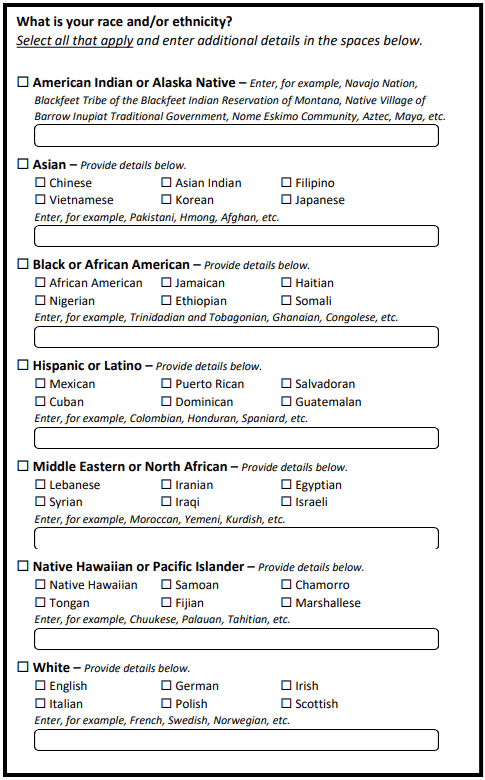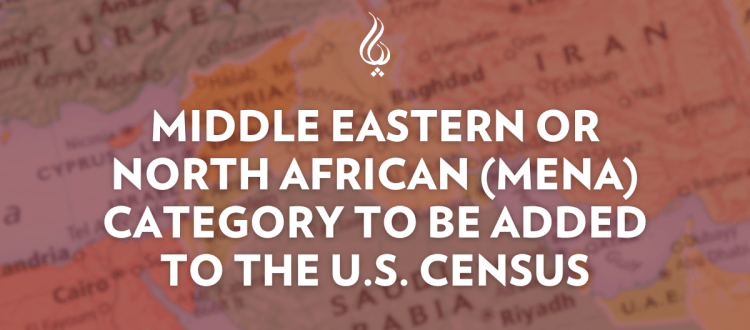Historical First: MENA Category To Be Added to U.S. Census
Washington, DC — Today, the Office of Management and Budget (OMB) announced its revisions to Statistical Policy Directive No. 15: Standards for Maintaining, Collecting, and Presenting Federal Data on Race and Ethnicity (SPD 15). PAAIA is pleased to share that these revisions include the addition of a Middle Eastern or North African (MENA) category on federal forms such as the U.S. Census!

What Is the New MENA Category?
The first of their kind since 1997, these changes introduce a combined question format for race and ethnicity allowing participants to choose from 7 categories and “Select all that apply.” One of those categories is the new MENA category which will contain checkboxes for Lebanese, Iranian, Egyptian, Syrian, Iraqi, and Israeli subgroups along with a write-in box for any other Middle Eastern/North African ethnicity. These checkboxes represent the MENA ethnicities with the largest populations here in the United States while providing others an option to add theirs as well.
Where Does PAAIA Stand?
PAAIA has been advocating for the inclusion of a MENA ethnic category for well over a decade. We have been working behind the scenes with OMB working groups on defining and including a MENA ethnic category and in both 2010 and 2020, we launched write-in campaigns to encourage Iranian Americans to write-in their ethnicity on the U.S. Census. Similar campaigns were initiated by other communities in the Middle East and North Africa regions resulting in a historic number of write-in campaigns, aptly demonstrating the need for a MENA ethnic category.
In early 2023, PAAIA joined a coalition letter to urge the inclusion of such a category in federal documents and surveys. PAAIA also reached out to our network to encourage Iranian Americans to submit a comment to the OMB’s Technical Working Group on Race and Ethnicity Standards in support of a MENA category. PAAIA’s efforts, along with those of many other organizations like the Arab American Institute and The Leadership Conference on Civil and Human Rights, resulted in over 20 thousand comment submissions to the OMB’s working group.
Reviewing those comments, the Biden Administration came to the conclusion that the inclusion of a MENA category is not only widely desired but would also provide important data that has been lacking for decades. Per the working group’s recommendations, agencies will now be required to collect this more detailed race/ethnicity information as a default, including specific data regarding our Iranian American ethnicity.
Why Does a MENA Category Matter for Iranian Americans?
Like other ethnic groups, the number of Iranian Americans in the United States has been historically underrepresented in Census data and other federal documents. The Census data alone informs the distribution of over $2.8 trillion in federal funding that is used to support vital programs and impact housing, education, transportation, and healthcare nationwide. Plus, the information gleaned from the Census determines the number of seats each state will have in the House of Representatives and is used to draw legislative districts based on population – a vital part of increasing our representation at all levels of government.
The data from a MENA category will also be used for research into the educational, health, and economic needs and trends of our community. When Iranian Americans are accurately counted, communities are able to provide us with more of the resources we require. These could include Persian-speaking nurses, community center funding, grants for nonprofits to meet the community’s needs, and specific assistance for Iranian American business owners. The data can even be used to monitor discriminatory practices and help identify discrimination based on national origin.
PAAIA is thrilled by the Biden Administration’s decision to include a MENA category in future federal forms including the 2030 Census. This major development could not have been achieved without the commitment and support of MENA communities who have remained fully dedicated to this goal throughout the decades-long process.

